- What Is the App Development Timeline?
- App Development Timeline at Designveloper
- How Long Does It Take To Make an App? An Overview of the App Development Timeline
- 1. The 2 - 3 First Weeks in the Planning Stage
- 2. Next 2 - 3 Weeks in a Business Analysis Stage
- 3. Spend 5 – 7 Weeks in the Design and Pre-development Stage
- 4. UI Design Stage Takes 3 – 4 Weeks
- 5. The 8 - 10 Weeks for the Development Stage
- 6. Back-end Development Stage Takes 6 – 8 Weeks
- 7. Front-end Development Stage Takes 6 – 8 Weeks
- 8. Testing Stage Takes 2 Weeks
- 9. Finalization and Launch Take 1 Week
- 10. Post-launch Support and Maintenance Stage Takes 2 Weeks
- The 7 Stages of the App Development Process
- Conclusion
It is now easier than ever to make your own app. All you need is some basic knowledge of coding and a computer with an internet connection. But how long does it take to develop an app and what about the app development timeline? For some apps, it can be as quick as a week or two, but for others, it could take months or years. It all depends on the complexity of the app and how much work goes into developing it.
This article will explore the various stages of mobile app development and look at the timeline for different types of apps. You’ll also learn about the cost, resources needed, and skills required for each stage. The article will also cover these stages in more depth so that you know what you’re getting into when you start making your own app.
What Is the App Development Timeline?
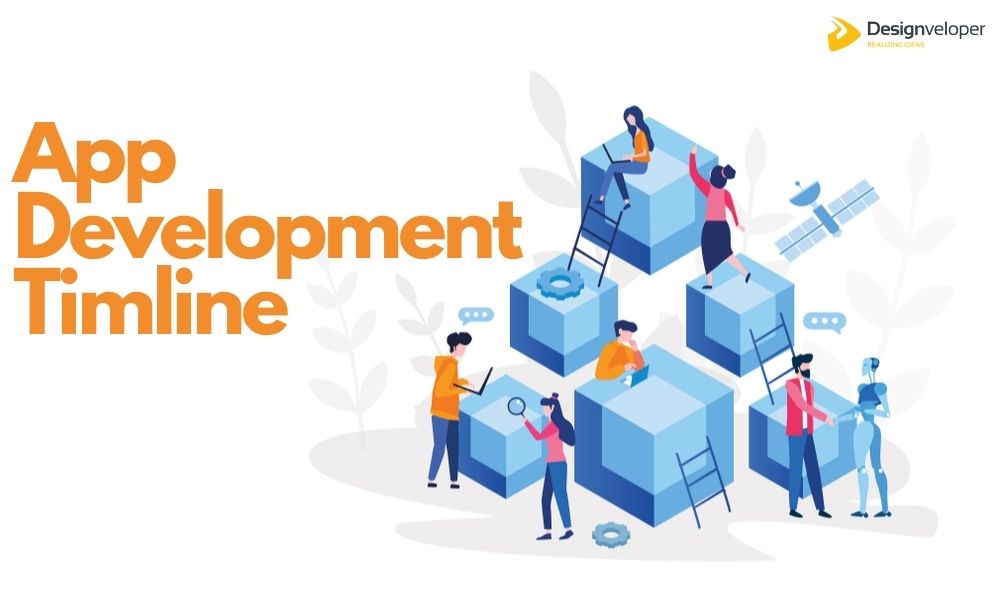
The app development timeline is the timing process of creating an app. It can be complex and lengthy, depending on the type of app you want to create. The good news is that there are many tools to help simplify the mobile development process, including platforms that offer templates for different types of apps.
App Development Timeline at Designveloper
At Designveloper, we understand the significance of having a well-defined mobile app development timeline when embarking on a new project. The duration of a mobile app project can vary depending on factors like app complexity and our clients’ specific requirements. Our dedicated team of experts is here to guide you through every step of the app development process, providing valuable insights and recommendations to ensure your project is completed on schedule and within budget.
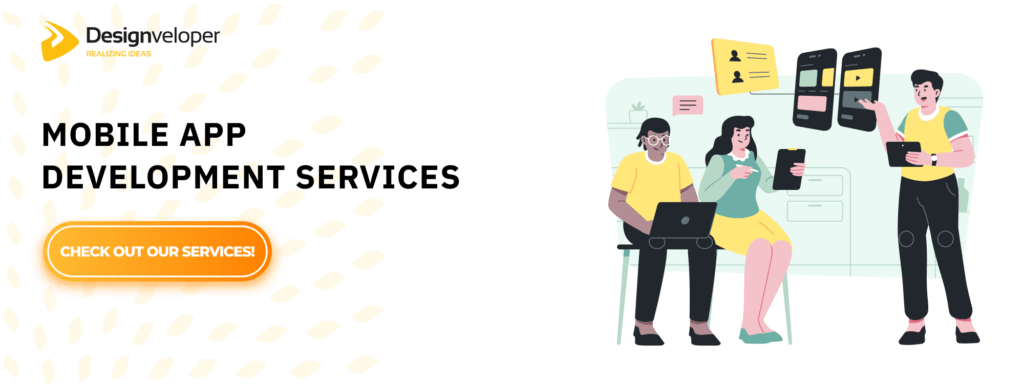
Our client-centric approach is at the core of our service philosophy. We work closely with you to gain a deep understanding of your unique needs, goals, and expectations. This collaboration allows us to craft a tailor-made solution that perfectly aligns with your vision.
One of the key advantages of partnering with Designveloper is our ability to efficiently deliver projects without compromising quality. We’ve honed a streamlined app development process that prioritizes a quick turnaround time while upholding the highest quality standards. Throughout the app development timeline, we maintain open and transparent communication, providing regular updates to keep you fully informed of the project’s progress.
We recognize that the success of your app extends beyond its launch date. That’s why we offer ongoing maintenance and updates to ensure that your app remains at peak performance and stays current with the latest technological advancements.
When you choose to collaborate with Designveloper, you gain access to our extensive expertise in mobile app development and our commitment to delivering projects on time and within budget, all while maintaining exceptional quality standards.
Words from our CEO
From our CEO:
“At Designveloper, we keep it simple and efficient in our app development process.
First, we listen to our clients in our initial meeting to understand their needs and discuss project requirements.
Our experienced team then provides a rough estimation (RE) covering costs, timeframes, and resources.
Once the client approves, we assemble a dedicated project team and offer a detailed estimation (DE) with specific features, costs, and a development schedule.
Our recommended tech stack includes AWS for infrastructure, React/NextJS for web development, React Native/Flutter for cross-platform mobile, NestJS for backend, and MongoDB/PostgreSQL for databases.
Our goal is to provide tailored solutions that meet project goals. By following this structured approach and using preferred tech stacks, we ensure a reliable app development timeline.”
How Long Does It Take To Make an App? An Overview of the App Development Timeline
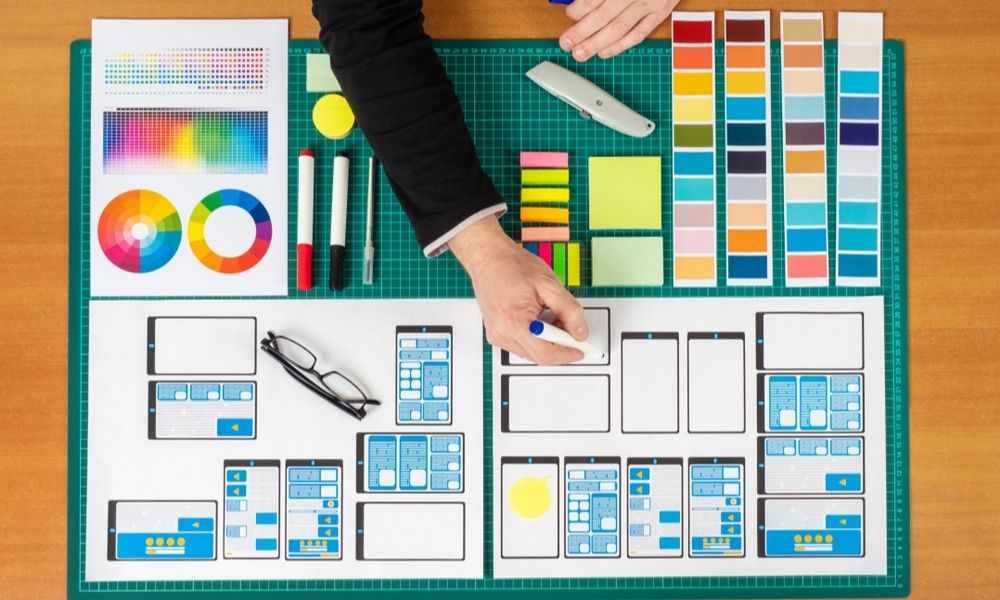
1. The 2 – 3 First Weeks in the Planning Stage
When you start planning your app, you need to choose a niche and decide what type of app it will be. You also need to figure out how long it will take to make your app. This stage might take 2-3 weeks working depending on the features your app will have, along with any other information that is essential for development, such as how much storage space all the features might take up. In this stage, you should also decide if you would like to use an existing mobile app framework or build your own.
Recommended reading: 20 Best Mobile App Development Companies In Vietnam
2. Next 2 – 3 Weeks in a Business Analysis Stage
The next stage of app development is business analysis. It takes at least two weeks for someone with a basic understanding of coding to set up the project and create an outline for the app. The business analysis takes into account what the app is, how it will be used, and where it will be used. This includes research about competitors, market size, demographics, and parameters for success. During this stage, you are able to figure out what the target audience is, who your competitors are, and what resources would be necessary to market your app.
This stage is important because, without the right data, you won’t know if you’re making a good decision with your app or not.
3. Spend 5 – 7 Weeks in the Design and Pre-development Stage
The design and the pre-development stage is generally the first phase of app development. In this stage, you develop a basic mobile app idea, its design, and other necessary components like user interface (UI) layout, graphics, and color schemes.
This stage also includes developing a development plan to make sure that a team will complete the app in the allotted time frame. The actual coding takes place once a developer has been hired to work on the project.
This is one of the main stages, which takes approximately five to seven weeks. This stage includes designing the look and structure of your app, coming up with a functional idea, and deciding on the scope of work you need to complete. During this stage, you should decide what type of app you want to create and how long it will take for you to develop it. Some apps can take months or even years to build, so you’ll need some patience if you’re planning on making an app that will be big and complex.
4. UI Design Stage Takes 3 – 4 Weeks
The UI design stage can be one of the most time-consuming of all the app development stages. This is because the process involves designing a user interface for your app. This includes determining what colors, fonts, and images to use in order to appeal to your target audience. So you should know the essential UI design principles and avoid common UI mistakes!
This stage also includes making sure that your app works with different devices and operating systems. You’ll need to learn about these factors before you start developing your app so that you know what will work best for your target audience.
This stage can take anywhere from three to four weeks if there are no complications like finding the perfect color or font for your app.
5. The 8 – 10 Weeks for the Development Stage
The time frame for this stage is dependent on the complexity of the app and how much work goes into developing it. App development is a long process that usually takes about 8-10 weeks to complete. There are also different stages of app development, and for each stage, there are costs associated with it. Some of the most expensive parts of app development cost as much as $100,000. So if you’re looking to develop an app without having a lot of money to spend, start by considering the following steps:
- The first phase is called “getting started”. After downloading the software needed for your project and creating a plan for your app’s features, this phase can last anywhere from two weeks to six months depending on how complicated your project is.
- The second phase begins when you begin coding the software in C++ or Java and it lasts anywhere from three days to four months. Once you’ve completed this step, you should have a place where users can log in or create an account and perform different functions with the help of the program.
- After this step, you’ll need to test your product as well as build its functionality into various browsers and platforms. This phase can last anywhere from three days to four weeks.
Recommended reading: How to Outsource App Development Successfully?
6. Back-end Development Stage Takes 6 – 8 Weeks
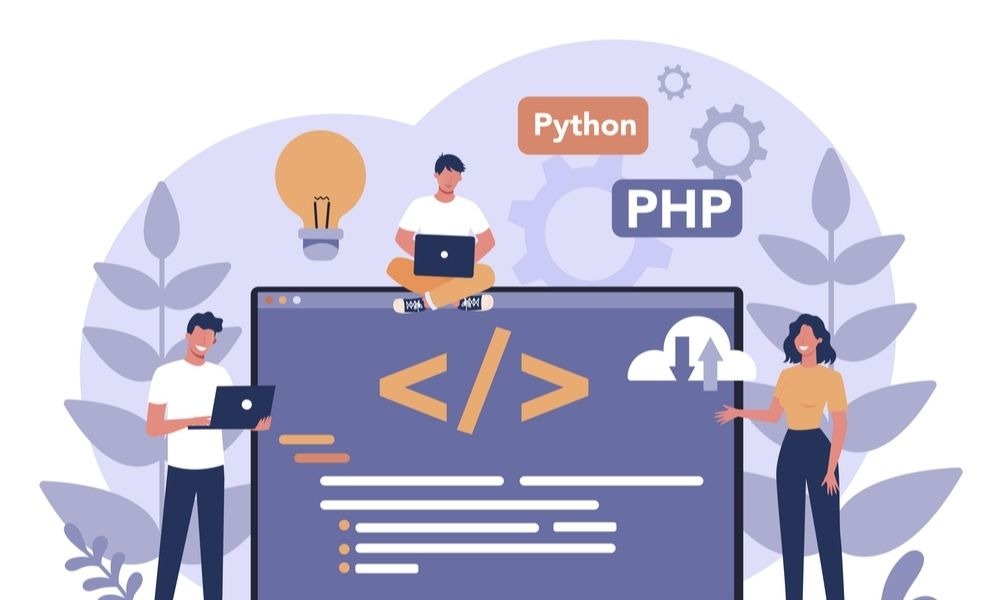
Part of the process of developing an app is coming up with the perfect idea. This can be anything from building a game to creating a business app. But before you start, you need to decide what stage your project will be in. The back-end development stage takes about 6 – 8 weeks, so this is the first step in the process. The back-end development stage usually involves building a website and backend programming for apps that are more interactive and have more features.
The next step is front-end development, where you focus on creating an interface and user experience for your app. This step also takes about 6 – 8 weeks, but it’s more focused on design instead of coding. At this stage, you create any graphics or animations necessary for your app such as logos or icons that are used throughout your interface.
The final step is testing and debugging which can take anywhere from 1 week to 2 months depending on how complex the bug or issue is.
Recommended reading: Custom Mobile App Development Process: A Detailed Guide
7. Front-end Development Stage Takes 6 – 8 Weeks
This phase takes between six and eight weeks to complete. A lot of design work goes into this phase, which could be the reason it takes so long.
The front-end development is the most important phase of an app’s development because it creates the visual interface that your users interact with on a daily basis. The developers will be using HTML, CSS, and JavaScript to create these pages. They’ll also have to use their creativity to come up with new features and designs for what they’re building.
This stage also requires good communication skills because the developers are constantly working together to make sure each page is visually appealing and functional for the users’ needs. In addition, there will be a lot of user testing during this time so that the team can make changes and improve the app as needed.
Once these changes are made, there will be a review process where you’ll have an opportunity to test out those changes before they get pushed live on the app store. At this point in time, if any major issues arise from testing, then more development will take place before going live again on an app store.
8. Testing Stage Takes 2 Weeks
The testing stage often takes around 2 weeks. During this period, you’ll be able to test your app on an iPhone (if it’s an iOS app) and see if it works as intended. If you have a software developer or designer involved, they will help make some changes before launching the app so that it will meet your specifications. And the question is designers should know how to code.
Once everything is ready, you can submit your app for review on the App Store. They will then take a look at what you’ve created and put it through their rigorous screening process before accepting it into their store.
9. Finalization and Launch Take 1 Week
The finalization and launch stage takes one week. This is the process of completing the app’s design and ensuring that it has proper functionality before it’s released to the public. This is also a good time to get feedback from beta testers about how to improve the app.
This stage will require some technical know-how, but there are many free resources on how to do this–such as tutorials or YouTube videos. Once you finish with this first stage, you’ll have a functioning app that’s ready for release!
10. Post-launch Support and Maintenance Stage Takes 2 Weeks
This stage can take up to 2 weeks, but it will be necessary for you to develop a sense of what your app is like after it has been released. This needs to be done so that you can fix any bugs and glitches in your app or update features that don’t work properly after the launch of your app. The post-launch support and maintenance stage is also important so that you can come up with a marketing strategy for your app, which will help improve its success rate.
Recommended reading: How to Save Big on eCommerce App Development Cost?
The 7 Stages of the App Development Process
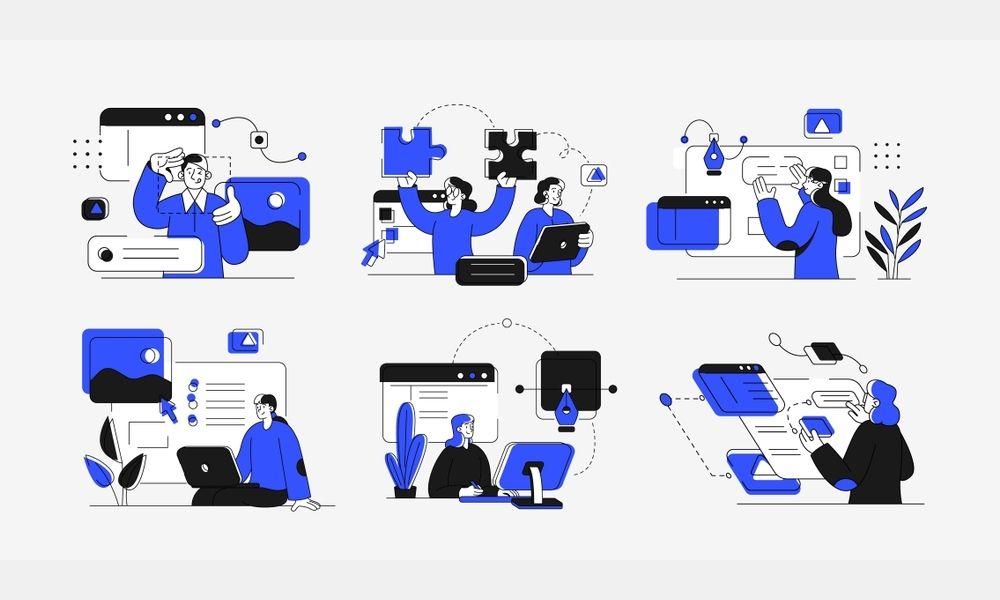
App development can take many different forms, but it’s most commonly broken down into seven stages. These stages are usually not experienced in order. There are some apps that require more time to develop, so they start with coding or design, for example. The three most common stages of app development are design, coding, and testing.
1. Business analysis stage
This stage is all about understanding your business and its goals and then figuring out how technology can help you reach those goals. It’s the first step in the app development process. The goal is to figure out what you want your app to do and how it fits in with your company’s bigger picture before you start coding anything.
2. UX design stage
Above all, UX design is one of the first things you’ll need to do when developing an app. UX stands for “user experience” and it’s how your app will look to the user. It’s an important stage because it will set the tone for your app and dictate how people use it. You’ll need to research what users might want in order to be successful, then design the layout of your pages based on those needs.
Recommended reading: What Does a UX Designer Do to Make the Best Product?
You should also take care not to introduce any unnecessary content, too many options, or confusing jargon that could frustrate the user. Finally, at this stage, you’ll work with a team of designers who can create wireframes, mockups, and style tiles—all of which help you visualize what your app will look like up front—and provide feedback on any changes you want to make before proceeding to the coding stage. For more detailed information about what is the exact UX design process.
3. UI design stage
This stage is the first of the mobile app design process. This step typically takes around 2 to 3 weeks, and it is necessary for the app developer to capture the user’s needs and preferences. The UI designer creates a mock-up for an app screen so that they can test it with the user. This allows them to keep working on different screens until they find one that meets the user’s expectations.
This is where you get ideas for what the app will look like and how it will function. In this stage, you start to put together the basic information about your app, create wireframes that show how the design will work, and determine what resources are essential to create your app.
Recommended reading: The 6 Factors to Choose a UI UX Design Company
4. Back-end development stage
This is the development of an app’s functionalities. This is where the team uses computer programming languages like HTML, CSS, Python, and JavaScript to create the app’s functionality. It covers everything from creating login sections to enabling in-app purchases. This stage typically takes one to four months depending on the complexity of the app and how much work goes into developing it.
5. Front-end development stage
The front-end development stage is the final stage of app design. It involves actually creating the app and its wireframes. This includes thinking about layout, colors, fonts, and user experience.
6. Testing and launching stage
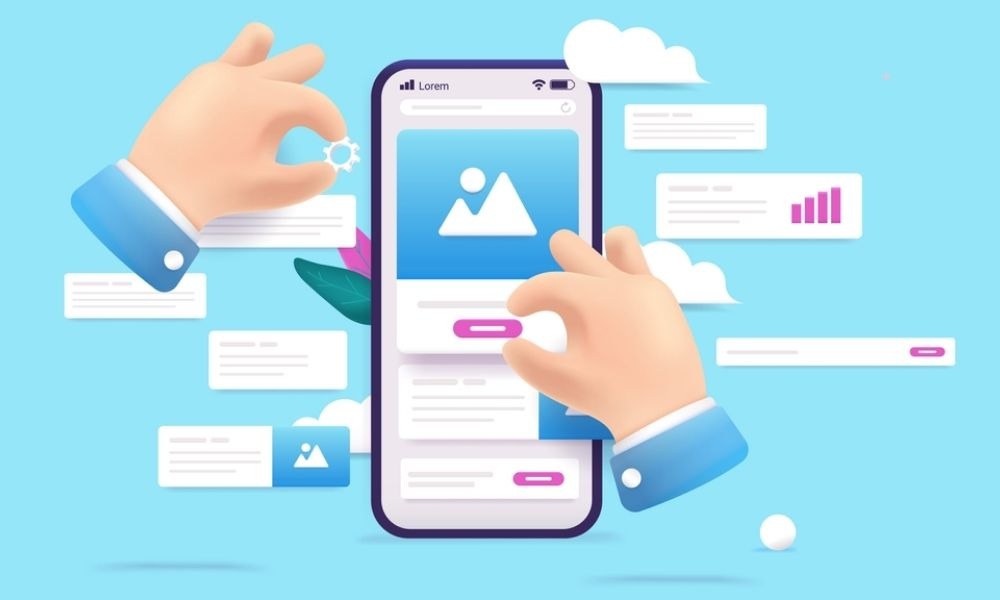
The testing and launching stage is arguably the most crucial stage of app development. This is when your app goes through rigorous testing. In order to avoid any last-minute bugs or errors that could have been avoided if they were spotted during development.
During this stage, you’ll need to hire experts in app design, and programming. The analytics to Quality Assurance processes your app for bugs and errors are the next important step too. Design experts play a key role in making sure your app is intuitive for users and easy to navigate. Programmers will be needed to make sure everything runs smoothly on the backend. Experts in analytics will be needed to monitor how well your product is performing after launch, optimizing it accordingly if necessary.
And if you’re struggling to find an expert for your app development project, Designveloper is one of the best choices at the moment. This incredible team offers all of the services needed for any size business and more – from web development to mobile application design, and consulting. Don’t hesitate to contact the team for more information.
7. Post-launch support and maintenance stage
This stage is an often overlooked and forgotten phase of app development that is very important. Post-launch support and maintenance ensure that the app remains up-to-date, secure, and running smoothly after it has been released to users.
App security is so important in this step. It can be difficult to find bugs and errors in your code after the release because you are so used to seeing the code. You may not know how to fix them or even where they are. That’s why post-launch support and maintenance are so important: It ensures the app continues running without issues for as long as possible.
Conclusion
It seems like every day there’s a new app that takes over our phones and computers. The growth in the number of apps is staggering and it’s no wonder that so many people want to get in on the action. But just how long does it take to make an app? What about the app development timeline?
This article already shows you how long it takes to make your app, from start to finish.
With this information at your fingertips, you can make a smart decision about whether or not you have what it takes to bring your idea to life.









